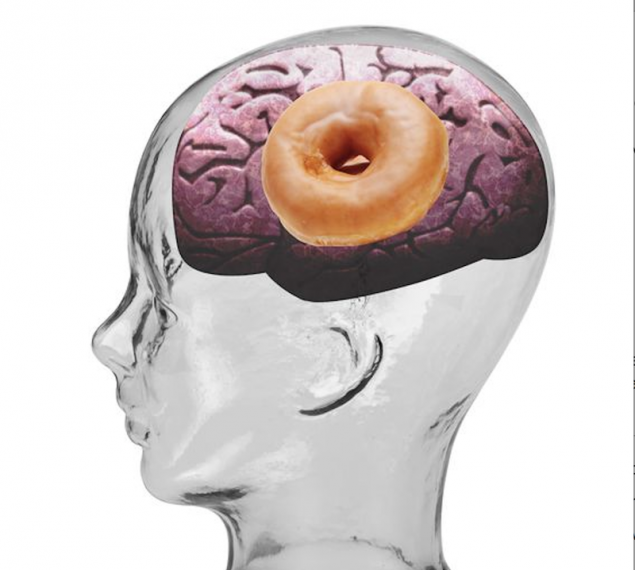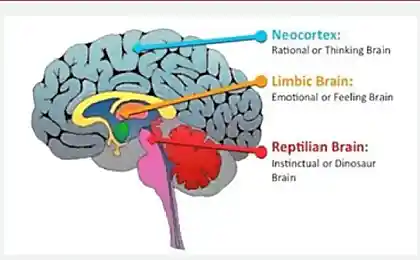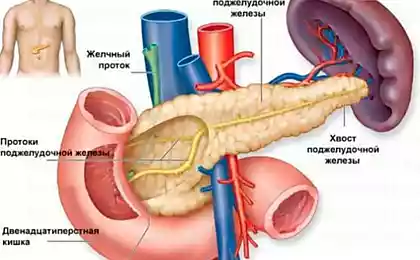526
Alzheimer's is "diabetes of the brain"
Alzheimer's disease is the most common form of dementia (senile dementia).
According to statistics, this neurodegenerative disease affects 11% of Americans over 65 years of age (one in nine) and 32% of Americans aged 85 years and older (one third!). The total number of patients with Alzheimer's in the U.S. is estimated at 5.2 million, in the world — about 44 million. In Russia with all the statistics is more complicated. According to data for 2006, Russia had been diagnosed 1.06 million patients with dementia.

But most cases of Alzheimer's disease attributed to natural age-related changes ("multiple sclerosis", "senile", "senile quirks", etc.) and according to some estimates about 90% of Russian cases of Alzheimer's are not diagnosed.
Alzheimer's is not only a fatal disease (life expectancy after detection of first symptoms 7 to 8 years), but one of the most costly to society of diseases that impose a huge financial burden on health authorities in different countries. In the US the direct costs of care for patients with Alzheimer's made in 2014 214 billion. But given the informal and unpaid care to their family and friends the total damage to the economy can be twice as much. If the problem of Alzheimer's disease is not resolved, then the forecasts for the year 2050 the disease will cost the U.S. economy $ 1.5 trillion.
The connection of Alzheimer's disease with type 2 diabetes, obesity and other metabolic disorders has been repeatedly noted by numerous studies, Alzheimer's disease, even sometimes called "diabetes of the brain". However, the nature and causes of communication has caused much debate and was not clear because the disease is detected and in excess, and with a lack of insulin.
Professor Melissa Schilling from new York University conducted a detailed integrated analysis of studies of the Association of diabetes with Alzheimer's disease with the aim to "unravel the tangle" of conflicting data about the role of insulin. The results of her research were recently published in the Journal of Alzheimer's Decease.
According to Melissa Schilling, a key role in the prevention and in the occurrence of Alzheimer's disease has a specific insulin-destroying enzyme IDE. The main function of this enzyme regulates the level of insulin in the body, because the IDE is able to remove the "extra" insulin. But the same enzyme is able to destroy the molecules of beta-amyloid is a special protein which consist the plaques in an Alzheimer's patient brain. In fact, this enzyme is the natural protection of the brain from harmful substances, leading to the disease, and that means any dysfunction associated with this enzyme can significantly increase the risk of Alzheimer's disease.
So, chronic lack of insulin (for example, in the absence of adequate treatment of type 1 diabetes), the body produces enough IDE that can lead to accumulation in the brain of beta-amyloid and other harmful proteins.
But type 1 diabetes is relatively rare and in the absence of treatment (i.e., insulin injections) in patients with a little chance to survive to the age at which dementia develops. Much more common is the reverse situation — the so-called hyperinsulinemia, i.e. the body produces too much insulin.
Hyperinsulinemia usually occurs when pre-diabetes, obesity and early stage type 2 diabetes. Increased production of insulin leads to increased and the level of IDE, but at some point the excess insulin becomes so large that it exceeds the capabilities of the IDE at the curb. And since "fight" with insulin — the primary function of the IDE, almost all produced by the body enzyme spent on this task. To protect the brain from beta-amyloid IDE is not enough, and this means that the risk of Alzheimer's increases dramatically.

The correct understanding of the relationship of insulin, IDE and Alzheimer's helps to understand why some patients insulin from the outside can be an effective cure, but others will only lead to serious deterioration. But most importantly, understanding these mechanisms opens the way to a significant reduction in the risk of disease.
"If we can disseminate this information and more people will be tested for hyperinsulinemia and treated her, it will lead to a significant reduction in the incidence of Alzheimer's disease and other diabetes-related complications," says Professor Schilling. — "Everyone must be tested — early and often, preferably in the form of HbА1С analysis (analysis on glycated hemoglobin), which does not require prior fasting. First of all should be tested patients with signs of dementia — some studies show that treatment of hyperinsulinemia may slow down or even reverse Alzheimer's disease".
Mass testing of the population for signs of insulin resistance is really very serious, but very promising task, it is still in the early stages to detect the signs of approaching diabetes, and to diagnose those patients who are not even aware that suffer from serious disease. Very often, the disease may be long enough to occur without symptoms and to detect it without testing it is impossible.
According to the Center for control and prevention (CDC) in the United States suffers from diabetes 9% of the population, or 29 million people. Of these, 8 million people (28% of all patients) nepredusmotritelen. In addition, another 86 million Americans have insulin resistance that is the cause of hyperinsulinemia.
In Russia, diabetes and pre-diabetes affects about a quarter of the population, however approximately half of patients with diabetes are not even aware of his diagnosis. When the testing procedure is very simple and inexpensive, and the tests can be taken in virtually every district hospital.
With regard to combating insulin resistance and hyperinsulinemia, as well as prevention of these pathologies, then things are pretty simple. In most cases, the key to success — modification of diet and serious restriction of consumption of foods that contribute to enhanced development of insulin — i.e., carbohydrates. As recent research suggests that the refusal of sweet and starchy foods will help keep not only a good figure, but also a sound mind in old age.published
P. S. And remember, only by changing their consumption — together we change the world! ©
Source: lchf.ru/13780
According to statistics, this neurodegenerative disease affects 11% of Americans over 65 years of age (one in nine) and 32% of Americans aged 85 years and older (one third!). The total number of patients with Alzheimer's in the U.S. is estimated at 5.2 million, in the world — about 44 million. In Russia with all the statistics is more complicated. According to data for 2006, Russia had been diagnosed 1.06 million patients with dementia.

But most cases of Alzheimer's disease attributed to natural age-related changes ("multiple sclerosis", "senile", "senile quirks", etc.) and according to some estimates about 90% of Russian cases of Alzheimer's are not diagnosed.
Alzheimer's is not only a fatal disease (life expectancy after detection of first symptoms 7 to 8 years), but one of the most costly to society of diseases that impose a huge financial burden on health authorities in different countries. In the US the direct costs of care for patients with Alzheimer's made in 2014 214 billion. But given the informal and unpaid care to their family and friends the total damage to the economy can be twice as much. If the problem of Alzheimer's disease is not resolved, then the forecasts for the year 2050 the disease will cost the U.S. economy $ 1.5 trillion.
The connection of Alzheimer's disease with type 2 diabetes, obesity and other metabolic disorders has been repeatedly noted by numerous studies, Alzheimer's disease, even sometimes called "diabetes of the brain". However, the nature and causes of communication has caused much debate and was not clear because the disease is detected and in excess, and with a lack of insulin.
Professor Melissa Schilling from new York University conducted a detailed integrated analysis of studies of the Association of diabetes with Alzheimer's disease with the aim to "unravel the tangle" of conflicting data about the role of insulin. The results of her research were recently published in the Journal of Alzheimer's Decease.
According to Melissa Schilling, a key role in the prevention and in the occurrence of Alzheimer's disease has a specific insulin-destroying enzyme IDE. The main function of this enzyme regulates the level of insulin in the body, because the IDE is able to remove the "extra" insulin. But the same enzyme is able to destroy the molecules of beta-amyloid is a special protein which consist the plaques in an Alzheimer's patient brain. In fact, this enzyme is the natural protection of the brain from harmful substances, leading to the disease, and that means any dysfunction associated with this enzyme can significantly increase the risk of Alzheimer's disease.
So, chronic lack of insulin (for example, in the absence of adequate treatment of type 1 diabetes), the body produces enough IDE that can lead to accumulation in the brain of beta-amyloid and other harmful proteins.
But type 1 diabetes is relatively rare and in the absence of treatment (i.e., insulin injections) in patients with a little chance to survive to the age at which dementia develops. Much more common is the reverse situation — the so-called hyperinsulinemia, i.e. the body produces too much insulin.
Hyperinsulinemia usually occurs when pre-diabetes, obesity and early stage type 2 diabetes. Increased production of insulin leads to increased and the level of IDE, but at some point the excess insulin becomes so large that it exceeds the capabilities of the IDE at the curb. And since "fight" with insulin — the primary function of the IDE, almost all produced by the body enzyme spent on this task. To protect the brain from beta-amyloid IDE is not enough, and this means that the risk of Alzheimer's increases dramatically.

The correct understanding of the relationship of insulin, IDE and Alzheimer's helps to understand why some patients insulin from the outside can be an effective cure, but others will only lead to serious deterioration. But most importantly, understanding these mechanisms opens the way to a significant reduction in the risk of disease.
"If we can disseminate this information and more people will be tested for hyperinsulinemia and treated her, it will lead to a significant reduction in the incidence of Alzheimer's disease and other diabetes-related complications," says Professor Schilling. — "Everyone must be tested — early and often, preferably in the form of HbА1С analysis (analysis on glycated hemoglobin), which does not require prior fasting. First of all should be tested patients with signs of dementia — some studies show that treatment of hyperinsulinemia may slow down or even reverse Alzheimer's disease".
Mass testing of the population for signs of insulin resistance is really very serious, but very promising task, it is still in the early stages to detect the signs of approaching diabetes, and to diagnose those patients who are not even aware that suffer from serious disease. Very often, the disease may be long enough to occur without symptoms and to detect it without testing it is impossible.
According to the Center for control and prevention (CDC) in the United States suffers from diabetes 9% of the population, or 29 million people. Of these, 8 million people (28% of all patients) nepredusmotritelen. In addition, another 86 million Americans have insulin resistance that is the cause of hyperinsulinemia.
In Russia, diabetes and pre-diabetes affects about a quarter of the population, however approximately half of patients with diabetes are not even aware of his diagnosis. When the testing procedure is very simple and inexpensive, and the tests can be taken in virtually every district hospital.
With regard to combating insulin resistance and hyperinsulinemia, as well as prevention of these pathologies, then things are pretty simple. In most cases, the key to success — modification of diet and serious restriction of consumption of foods that contribute to enhanced development of insulin — i.e., carbohydrates. As recent research suggests that the refusal of sweet and starchy foods will help keep not only a good figure, but also a sound mind in old age.published
P. S. And remember, only by changing their consumption — together we change the world! ©
Source: lchf.ru/13780
The UAE will build the world's largest solar power station
Parents and children: 5 hard truths that must be recognized























